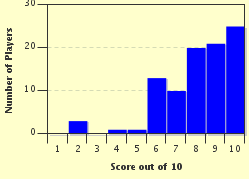Quiz Answer Key and Fun Facts
1. In English, what is the meaning of perro, hund, cachorro, cane and chien?
2. In English, what do cipele, boty, chaussures, kurpes, sko, obuwie, esgidiau and kasut mean?
3. What do bolacha, kaka, galleta, ciastko, koekje and Plätzchen mean in English?
4. What is the English meaning of farvel, au revoir, addio, sudie, la revedere and macsalaamo?
5. Can you translate trappe, portaat, escalier, scala, escada, schodisko and merdiven into English?
6. What is the English translation of equus, kabayo, hest, cheval, Pferd, hestur and konj?
7. In English, what is the meaning of dugme, knoop, nappi, bouton, Taste, pulsante and mygtukas?
8. In English, what do petull, Krofna, bunyol, Krapfen, ciambella, spurga and rosquinha mean?
9. What do shtrat, ohea, seng, voodi, lit, letto and cama mean in English?
10. What is the English meaning of zjarr, tulekahju, feu, Feuer, fuoco, fogo and fuego?
Source: Author
FatherSteve
This quiz was reviewed by FunTrivia editor
stedman before going online.
Any errors found in FunTrivia content are routinely corrected through our feedback system.


